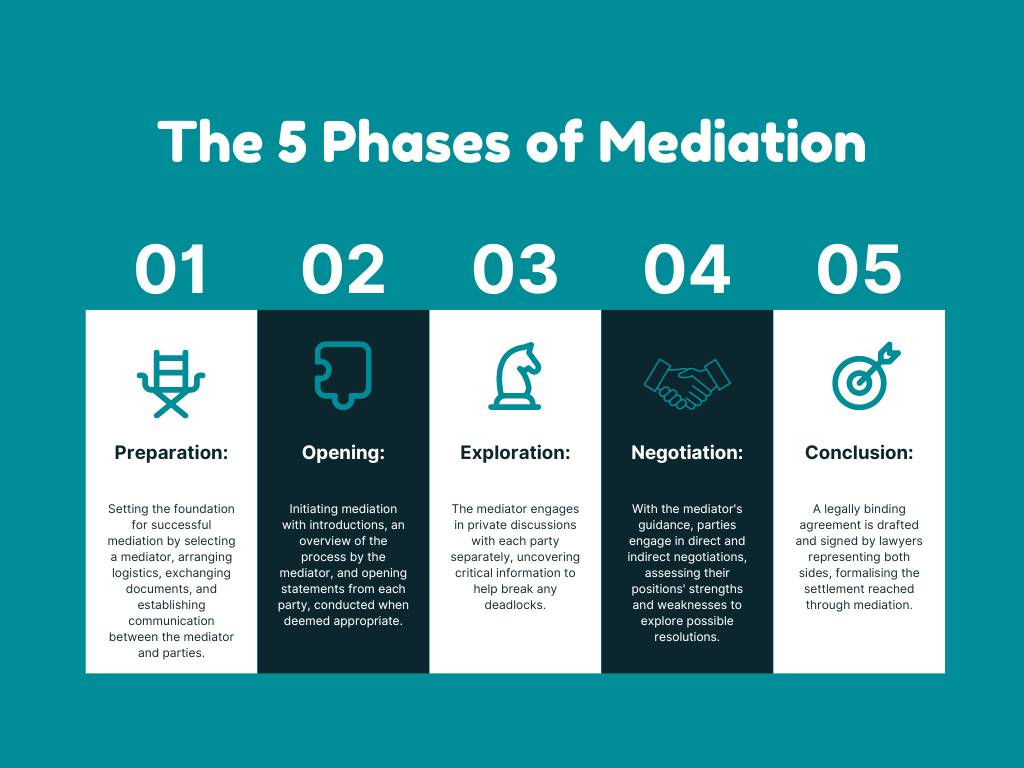
What Are The 5 Phases of Mediation?
Understanding the phases of mediation is crucial for anyone considering mediation as a solution to their dispute. Our expert team in Dublin, with an over 80% success rate is dedicated to guiding individuals and organizations through each step, ensuring a clear, efficient path to resolution.
Why Understanding the Phases of Mediation is Essential
The mediation process is divided into distinct phases, each designed to facilitate communication, understanding, and ultimately, agreement between disputing parties. By familiarising yourself with these phases, you’ll be better prepared to engage in the mediation process, setting the stage for a more positive outcome.
The Structured Phases of Mediation
Mediation involves several key phases, from preparation to resolution. Our experts break down the process into manageable steps:
- Preparation: Setting the foundation for successful mediation by selecting a mediator, arranging logistics, exchanging documents, and establishing communication between the mediator and parties.
- Opening: Initiating mediation with introductions, an overview of the process by the mediator, and opening statements from each party, conducted when deemed appropriate.
- Exploration: The mediator engages in private discussions with each party separately, uncovering critical information to help break any deadlocks.
- Negotiation: With the mediator’s guidance, parties engage in direct and indirect negotiations, assessing their positions’ strengths and weaknesses to explore possible resolutions.
- Conclusion: A legally binding agreement is drafted and signed by lawyers representing both sides, formalising the settlement reached through mediation.
Mediation and Conflict Resolution Services in Ireland
While there are countless use cases for mediation in resolving conflicts, our select services are designed to provide clarity, direction, and resolution in various disputes, including but not limited to:
- Partnership and Boardroom disputes: Facilitating dialogue between partners and board members to resolve conflicts and realign on common business objectives.
- Shareholder disputes: Addressing disagreements among shareholders, focusing on equitable solutions that serve the best interest of the company and its stakeholders.
- Breach of Contract: Assisting in the resolution of disputes arising from allegations of unmet contractual obligations in various business contexts.
- Debt Collection: Assisting creditors and debtors in finding mutually agreeable solutions to debt recovery, avoiding the need for more confrontational legal actions.
- Employment Termination: Mediating disputes related to the termination of employment, focusing on fair and respectful resolutions.
- Separating couples: Facilitating amicable agreements on property division, child custody, and other concerns for couples going through separation.

The Benefits Of Mediation:
- Cost-Effectiveness: Mediation generally requires less time and financial investment than traditional litigation. By streamlining the preparation, negotiation, and conclusion stages, parties can avoid the extensive legal fees and court costs associated with going to trial.
- Confidentiality: Unlike court proceedings, which are public, mediation is a private process. The confidentiality aspect ensures that sensitive information disclosed during the mediation remains between the parties involved, the mediator, and any legal representation, protecting reputations and business relationships.
- Control and Flexibility: Mediation gives parties more control over the outcome of their dispute. Unlike a court verdict, which is decided by a judge or jury, mediation allows the parties to negotiate and agree upon a solution that works best for them, offering flexibility in terms of possible outcomes and agreement terms.
- Speed: The mediation process is typically much faster than the court system. Since parties can schedule mediation at their convenience and work intensively through the stages of preparation, exploration, negotiation, and conclusion, disputes can be resolved in a fraction of the time it would take to litigate the same issues.
- Preservation of Relationships: The mediation process, particularly through its exploration and negotiation stages, encourages open communication and mutual understanding. By focusing on collaborative problem-solving rather than adversarial confrontation, mediation can help preserve and sometimes even strengthen relationships between the parties, which is especially important in disputes involving ongoing business or personal connections.
Seeking A Mediator?
Navigating conflicts can be challenging, but at Austin Kenny Mediation Service Dublin & Conflict Resolution, we understand the value of resolving disputes outside the courtroom. As one of Ireland’s leading professional mediators, you will have access to my extensive mediation experience so that you have the best possible opportunity of reaching a deal. Our mediation services provide a private, controlled, and supportive environment where all voices are heard. My overall success rate stands at 83% and I will work with you and the other side to make sure that resolve any obstacles preventing settlement.

